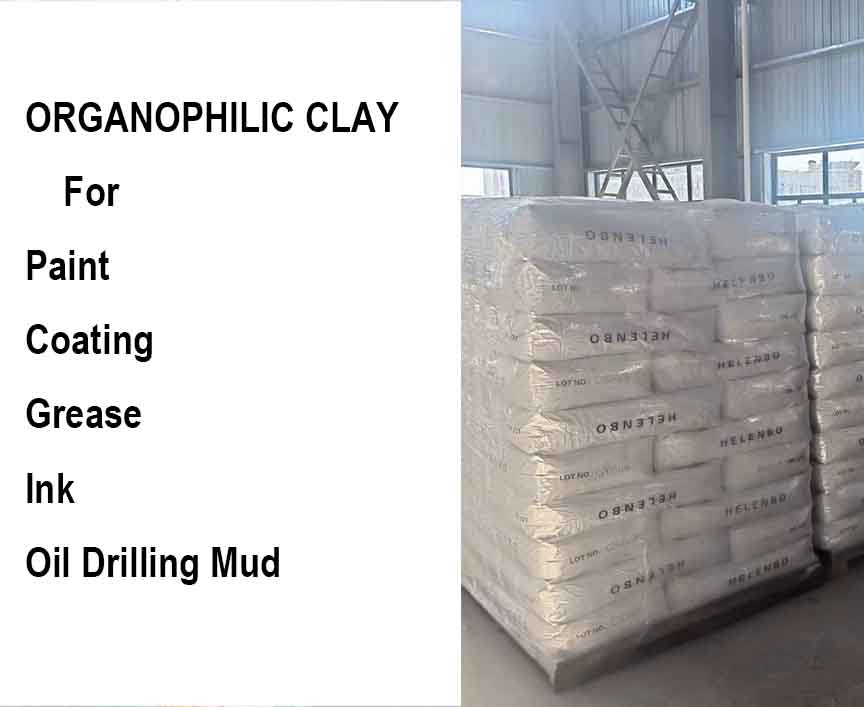organic bentonite clay
The raw material of organic bentonite clay comes from natural mineral montmorillonite. It is used in paint coatings as a thickening rheological additive. Our discussion group clay has a white powdery appearance, very soft and fine in texture. It disperses very easily. When organic bentonite is used in cosmetics, it can have a good thixotropic effect. Natural montmorillonite, after modification through weathering and aging to form clay, is used in organic production. When the clay is mixed with water, it rapidly expands, suitable not only for cosmetics but also for paints, coatings, lubricants, and oilfield drilling fluids.
organic bentonite clay for paint,grease,ink,oil drilling mud
organic bentonite clay
We provide organic bentonite clay, which has more than 20 years of experience. It is a modified bentonite. Its main application areas include oilfield drilling fluids, fracturing fluids, paints and coatings, greases, inks, cosmetics and sealants. The main goal is to achieve lubricity, thixotropy, rheology and anti-settling properties throughout the formulation.
At present, everyone has different names for it in the market, including: Organoclay,organophilic clay,rheology modifier and organo bentonite etc.
Properties of organic bentonite clay
Composition Organic derivative of a montmorillonite clay
Appearance Fine powder, white
Moisture content (105℃,2hr) ≤3.5%
Loss on ignition (1000℃) 29%-32%
Bulk density 0.53g/cm3
Fineness (<74μm, %) ≥98%
- Exerts gelling efficiency over a wide range of intermediate and low polarity
- Easy dispersing
- The gel is colourless and of high clarity
- Produce reproducible thixotropic consistency over a wide temperature range
- Imparts particle suspension, sag resistance without impairing flow and leveling, preventing hard settling of pigment and fillers
- Exerts strong film reinforcing action in organic binder systems
We sincerely look forward to your inquiry and request for samples, and we will fully support the development of your project.
Organic bentonite clay has a wide range of uses, with active research in the fields of dye decolorization, pigment anti-sedimentation, organic wastewater treatment, pesticide adsorption, composite materials, anti-seepage, pharmaceutical sustained release, inks, latex paints, coatings and catalysis.
Application of organic bentonite clay
Organoclay is used in the following applications:
Oil Drilling Mud(For diesel)
Paint /Coatings
Inks
Grease
Cosmetic
sealant
If you want to apply organic bentonite to grease, you must first know whether the base oil of your grease is diesel, mineral oil or synthetic oil, because this will directly affect the model we recommend to you.
At the same time, whether your lubricant is a water-based system or a solvent-based system is also very important information for us.
Kraft paper bag with PE liner or multi-wall paper sacks or customized. 25kg/bag or 22.68kg/bag or customized.
16MT/20FCL with pallet.
25.5MT/40FCL with pallet.
The information on use is based on data which are believed reliable, but any recommendation or suggestion made are without guarantee or warranty, since the conditions of use are outside our control.
All products are sold on the conditions that purchasers shall make their own tests to determine the suitability of such products for their purpose and that all risks are assumed by user.
We disclaim any responsibility for damages resulting from careless or improper handling or use. Nothing herein is to be taken as permission, inducement or recommendation to practice any patented invention without a license.
The processing methods of organic bentonite clay include wet processing and dry processing, which also include pre-gelling method. These different processing methods give organobentonite some common features. For example, they all possess the suspension properties, thixotropic properties and rheological properties of organobentonite. Organic bentonite, including water-based bentonite and oil-based bentonite.
We provide corresponding targeted bentonite models according to users’ different systems.
Organic bentonite can increase the viscosity of the organic system to improve its rheological properties. For example, adding organic bentonite to some inks will increase the viscosity, making it easier to operate during printing and drying very quickly.
At the same time, organic bentonite is also used in some inks, so its unique suspension performance can control the penetration of porous agents in the ink to change the permeability and uniformity, so that it will not be blurry, but clearer, and organic bentonite is added to the paint. Bentonite can improve the suspension and fluidity of paint. And it prevents the pigment from settling, which means it prevents the pigment from settling.
The texture of organic bentonite is very fine and non-hazardous.
The advantages of organic bentonite clay are obvious. Besides preventing settling and resisting sagging, it also possesses good thixotropic properties, high shear viscosity capabilities, suspension, and thickening properties.
Organic clay bentonite has a layered structure of montmorillonite that can form a gel in organic solvents, oils, and some resins. It has good thixotropic and suspension stability, visible lubricating and thickening properties, and receives good user feedback on chemical stability. Apart from its significant applications in the gaming industry, it has also been well received in some petroleum industries, lubricant industries, and ink industries.
It can be widely used in adhesives, putty powder coatings, anti-corrosion paints, matching with low to high polarity solvents. It shows good compatibility in systems such as aliphatic, aromatic, or aromatic hydrocarbon compounds.
